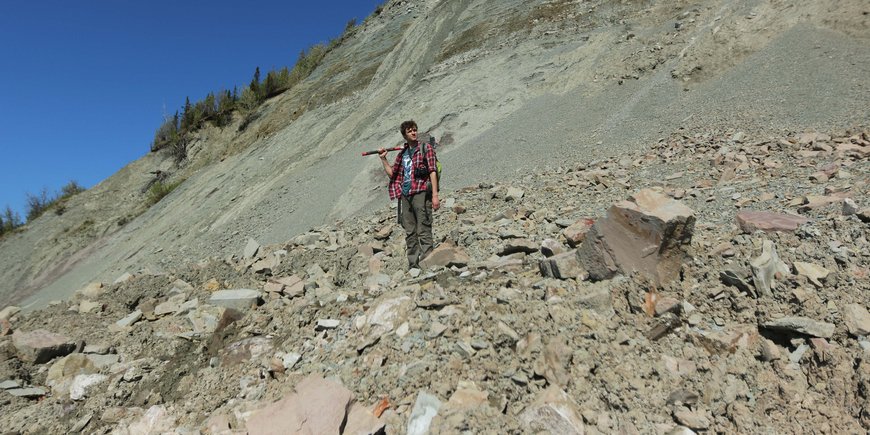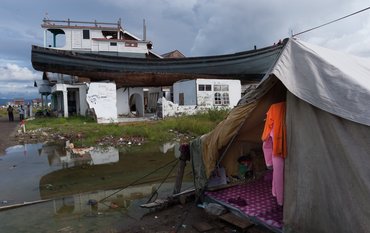Dr. Ilya Bobrovskiy, scientist in Section 3.2 “Organic Geochemistry”, has won a Starting Grant from the European Research Council (ERC) in the amount of 1.5 million euros. He will use the grant to research the composition of ancient ecosystems and the carbon cycle at the time of the emergence of complex life on Earth. The ERC Starting Grant is a prestigious fellowship awarded to excellent young scientists with two to seven years' experience after their doctorate.
Brandenburg's Research Minister Manja Schüle congratulates:
“Congratulations to Ilya Bobrovskiy on the prestigious EU funding! His fascinating research project aims to investigate the composition of ancient ecosystems. Looking back into the Earth's early history is also so exciting because it should provide insights into what a habitable planet needs in order to develop complex life. The latest grant success is further proof that the GFZ on Brandenburg's smartest mountain has been providing forward-looking, indispensable impetus for international geological, environmental and climate research for years. It is impressive to see the success with which the GFZ regularly applies for the coveted grants of the European Research Council. This makes us extremely happy – and proud.”
Susanne Buiter, Scientific Director of the GFZ, said:
“When we do research on behalf of society, we also do it with basic research like that of Ilya Bobrovskiy. He deals with the origin of life and the mechanisms of evolution. Ilya Bobrovskiy combines geology, chemistry and biology to get to the bottom of these questions. I am delighted that his excellent work has now been honoured with an ERC grant and congratulate him on behalf of the GFZ.”
The research project
For almost four billion years, bacteria have dominated life on our planet. In this context, the transition from the bacterial world to proliferation of single-celled eukaryotic algae and eventually to the diversification of animals was relatively rapid, taking around 250 million years. Scientists assume that this sequence of 'rapid' ecological and evolutionary changes was caused by unprecedented environmental perturbations that occurred during this period, including global glaciations and possible massive changes in the carbon cycle, but the specific nature of these perturbations remains uncertain. Such environmental disturbances are recorded in the Earth's sedimentary rocks and therefore, can be traced today.
Using new methodological approaches at the interface of organic geochemistry, isotope geochemistry and palaeontology, Ilya Bobrovskiy wants to decode the record of coevolution of life and environments throughout this crucial time period. He thus aims at tracking down what environmental changes may have shaped the development of life from tiny single-celled bacteria to large and extremely complex animals, and how the rise of complex life may have affected the environments on our planet. The research project can shed light on how life on our planet reacted to what may have been the greatest disturbances in the global carbon cycle in Earth's history – and may thus provide insights into the origins of modern biodiversity and potential future developments caused by climate change.
With the help of the ERC Starting Grant, Ilya Bobrovskiy will be able to pursue his promising ideas within the framework of his own project and put together a research team for it.
About Ilya Bobrovskiy
Dr. Ilya Bobrovskiy has been studying the circumstances of the origin of complex life on Earth for many years. In particular, he studied some of the oldest animal communities on our planet, the Ediacara biota, and the environments they inhabited.
The research career took him from Russian universities via Australia and the USA to the GFZ in Potsdam. He first completed his Master's degree in sedimentary geology at Lomonosov Moscow State University. This was followed by a doctorate in geobiology at the Australian National University. Bobrovskiy then conducted postdoctoral research at the California Institute of Technology until 2021. Since 2022, he has been a Branco Weiss Fellow at the GFZ with Prof. Dr. Christian Hallmann in Section 3.2 “Organic Geochemistry”.
About the ERC Grant
The European Research Council (ERC) is the main European funding body for excellent frontier research. It funds creative researchers of all nationalities and ages to carry out projects across Europe. The ERC offers four central funding programs: Starting Grants, Consolidator Grants, Advanced Grants and Synergy Grants. With its additional Proof of Concept Grants programme, the ERC helps grantees to bridge the gap between their ground-breaking research and the early stages of its commercialization. The ERC is governed by an independent governing body, the Scientific Council. The total budget of the ERC for the years 2021 to 2027 amounts to more than EUR 16 billion and is part of the Horizon Europe program.






![[Translate to English:] Fire in a forest, smoke rising, aerial view from above](/fileadmin/_processed_/8/3/csm_2025_01_06_AdobeStock_415831729_5a0e6d50d3.jpeg)









![[Translate to English:] [Translate to English:] Abror Gafurov von dem Schriftzug "Welcome to Azerbaijan" und den UN und COP Logos](/fileadmin/_processed_/2/5/csm_2024_11_Baku_COP29_Abror_Gafurov_1042faec82.jpeg)


![[Translate to English:] Martin Herold standing in front of the library on the Telegrafenberg](/fileadmin/_processed_/c/d/csm_Martin_Herold_d385ee4dd9.jpeg)
![[Translate to English:] Many people are listening to a presentation in the GFZ lecture hall.](/fileadmin/_processed_/c/a/csm_1_Bild1_hell_b9c0e9f5ed.jpeg)






![[Translate to English:] Both scientists sitting on stools in front of a wall of books in the Telegrafenberg library](/fileadmin/_processed_/6/6/csm_Buiter_Castell_DORA_4_e87cb1ea18.jpeg)
![[Translate to English:] Gruppenbild mit 4 Personen](/fileadmin/_processed_/8/d/csm_20241017_GFZ-Emmerman-Medal-005_web_reinhardtundsommer_21a414fa4a.jpeg)






![[Translate to English:] Ice landscape with five red tents](/fileadmin/_processed_/8/9/csm_Zeltlager_auf_dem_Eis_Urheberin_Jenine_McCutcheon_5ced2d523b.jpeg)